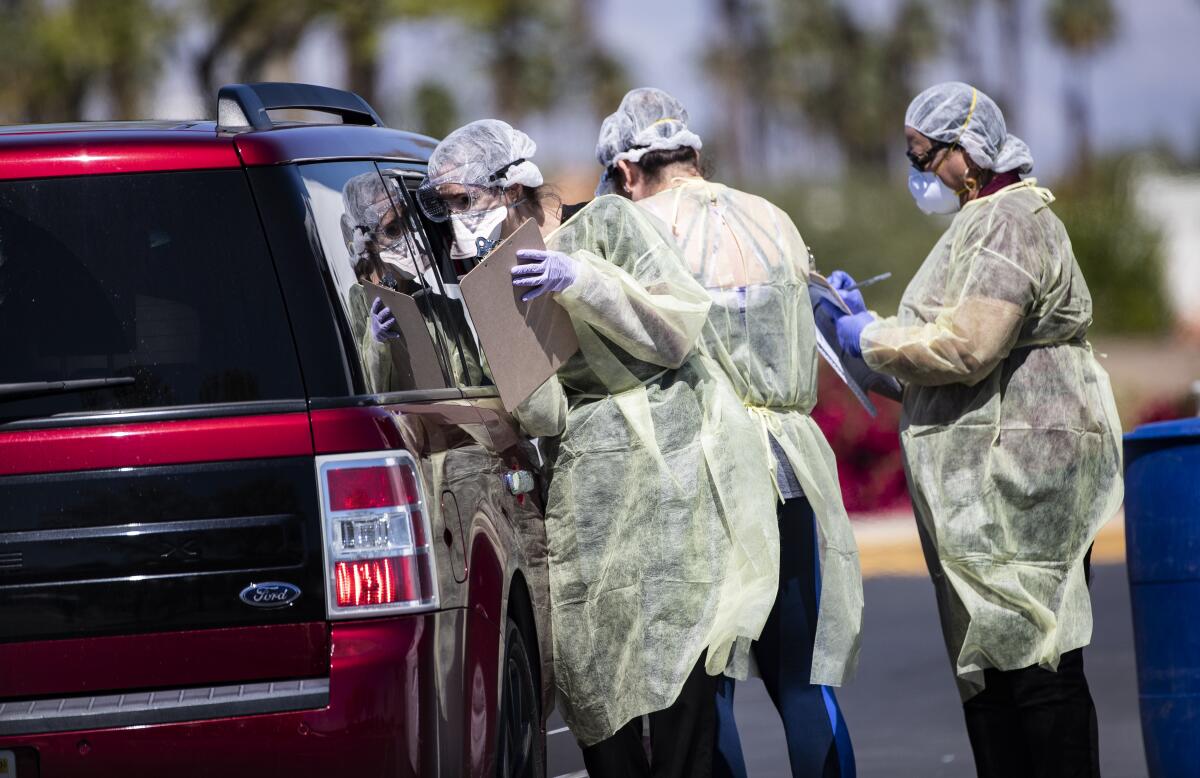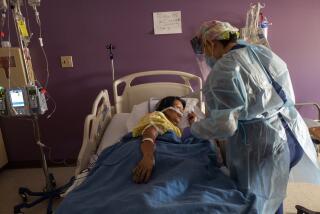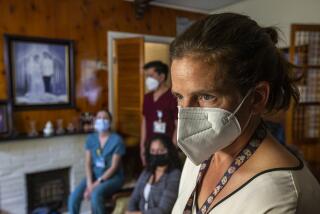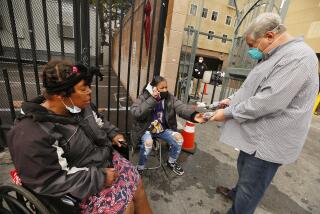Riverside County in urgent need of hospital beds, ventilators for coronavirus patients

All hospital beds in Riverside County could be occupied by mid-April if local coronavirus cases continue to rise at their current rate, according to a modeling projection calculated by Geoffrey Leung, Riverside University Health System’s chief of medical staff.
On Tuesday afternoon, the county reported 371 confirmed cases — 80 more than the previous day — and 13 fatalities, records show.
During a news conference last Thursday, Leung said cases of COVID-19 in Riverside County were doubling every 4.7 days. This means the current 371 cases could jump to nearly 1,500 by the week of April 12, according to surge projections.
The number of current cases, however, already have surpassed the county’s initial forecasts.
Though health officials predicted about 214 cases by Monday, the number of cases reached 291, well over the original projection, Brooke Federico, the county’s public information officer, said Tuesday.
Health officials said their projections were based on the county’s latest statistics and were expected to change over time.
If cases continue at this rate, or faster, all basic hospital beds could be filled by April 22 and intensive care beds could be filled by April 12, officials showed on their Facebook page. On Tuesday, the county reported there were 1,399 available hospital beds and 102 ICU beds. Leung anticipates the county will need an additional 3,000 beds by early May to treat the anticipated increased number of COVID-19 patients.
In addition to hospital bed shortages, health officials forecast that the county could run out of ventilators by April 26. The county currently has 172.
By early May, officials said there could be 9,000 virus-related hospitalizations, 50,000 confirmed cases and 1,000 deaths.
“This underscores the importance of all of our hospitals having a surge plan and plans for expanding their hospital beds and intensive care unit beds,” Leung said during the news conference last Thursday.
To meet these demands, officials are hoping that federal medical stations will help alleviate stress at local hospitals. A 125-bed station at the Riverside County Fairgrounds in Indio is expected to be operational within a few days, Federico said. There are about 35 staffers — including 25 members of the California Medical Assistance Team and 10 from the state’s National Guard medical strike team — at the site.
A second temporary hospital, which will also offer an additional 125 hospital beds, is still in the works. Federico said the county was still deciding on a location.
The additional 250 beds were not included in Leung’s projections, she said Wednesday.
On Tuesday, the county announced a new public health recommendation for residents to cover their nose and mouth when leaving home for essential errands or appointments. The face coverings don’t have to be hospital grade, as those should be saved for medical workers, Leung said. Instead a bandanna, fabric mask or neck gaiter will suffice. These items can be washed and reused.
“We’re seeing our numbers increasing even sooner than we predicted, and that means our strategy must change too,” Dr. Cameron Kaiser, the county’s public health officer, said Tuesday. “Covering your face doesn’t change the orders everyone must abide by to stay home as much as possible and maintain social distancing, but it’s an extra layer of protection that I think we need to add.”
Riverside County appears to be the first in Southern California to implement this recommendation, although the Centers for Disease Control and Prevention’s advice is unequivocal: Healthy people who do not work in the healthcare sector and are not taking care of an infected person at home do not need to wear masks. Riverside County officials said a Cochrane Review study cemented their decision to move forward with this recommendation.
“Based on our research, cities that have been able to flatten the curve [implemented] face coverings [to be worn by] the general public,” Federico said. “A number of studies show that droplet transmissions significantly reduce” when the general public dons masks.
Face coverings also deter people from touching their faces, spurs them to wash their hands more frequently, and encourages them to continue practicing social distancing while influencing others around them to do the same, she said.
Kim Saruwatari, the county’s director of public health, told residents that, although projections of increasing numbers of COVID-19 cases and fatalities seemed alarming, the county could help determine its own fate.
“The numbers that Dr. Leung shares are frightening, no doubt, but that is only one possibility,” she said during last Thursday’s news conference. “That doesn’t have to be our future. By taking recommendations seriously, we can change those numbers. We have the ability to control our own future as a county, but it’s going to take all of us working together.”
In addition to the recommendation to wear masks, county officials are requesting that the public send donations of supplies including masks (surgical, N95 or handmade), cardiac monitors and personal protective equipment to hospitals. The county is also seeking more medical volunteers including physicians, nurses, pharmacists, assistants and technicians to assist with patients. Only licensed practitioners or students pursuing degrees in any of those areas can volunteer.
For more information on how to volunteer or donate supplies, visit the county’s website.
More to Read
Sign up for Essential California
The most important California stories and recommendations in your inbox every morning.
You may occasionally receive promotional content from the Los Angeles Times.











